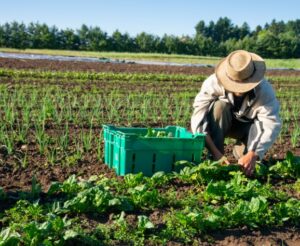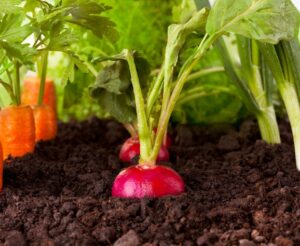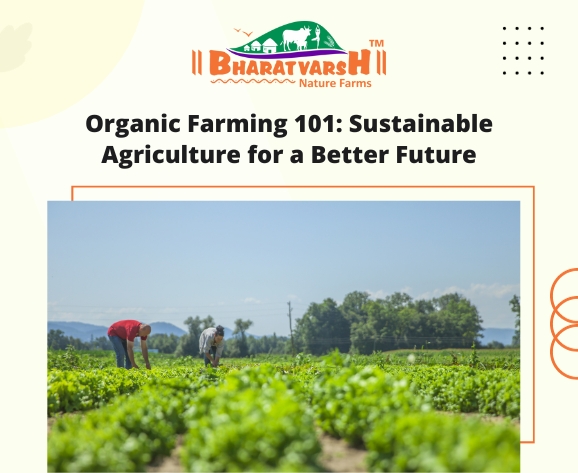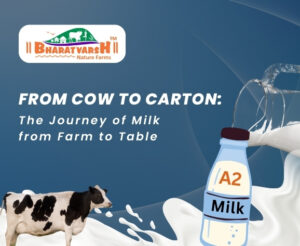A significant trend in the constantly changing field of contemporary agriculture is adopting eco-friendly and long-term sustainable techniques. Organic farming is leading this shift, which has many advantages, including bettering soil health, promoting biodiversity, and creating wholesome, chemical-free food. This extensive blog examines the world of organic farming, its guiding principles, and its contributions to a better, more sustainable future.
Organic Farming: What Is It?
Organic farming is a complete agricultural production system based on a sustainable and all-encompassing strategy. This strategy prioritizes the health of the environment, customers, and the earth. It sets itself apart from traditional farming by not using genetically modified organisms (GMOs), artificial pesticides, or herbicides. Instead, organic farming uses tried-and-true farming methods, refined over generations, along with natural fertilizers.

Sustainable Farming: The Fundamental Concept!
Sustainable agriculture, which is sometimes confused with organic farming, is a comprehensive method of producing food and fiber that extends beyond the confines of the farm. Its main goal is to protect the whole ecosystem’s health, including the soil, the surrounding area, and most crucially, the people who depend on it.
1. Improving Soil Health: Sustainable agriculture prioritizes soil health because it understands that robust soil is essential to long-term and prosperous farming. Methods including crop rotation, composting, and little soil disturbance are used to keep soil fertile.
2. Preservation of Ecosystems: Sustainable agriculture recognizes that farms are a component of a broader ecosystem. Farms managed sustainably contribute to biodiversity conservation and reduce the harm agriculture causes to neighboring ecosystems.

3. Fulfilling present Needs: While keeping an eye on the effects of its activities, sustainable agriculture seeks to satisfy society’s present needs for food and fiber production. It aims to guarantee that our current wants are satisfied without jeopardizing the ability for future generations to meet their own.
4. Long-Term Vision: Sustainable agriculture takes a long-term approach rather than concentrating on immediate results. It tries to develop a system that can be maintained perpetually while considering the broader effects of farming techniques.
5. Responsible Resource Use: Sustainable agriculture promotes the responsible use of natural resources, such as water, land, and energy, recognizing that these resources are finite and must be used wisely.
The Pillars of Organic Farming!
The following are some:-
1. Farming Without Chemicals
Steering clear of synthetic chemicals is one of the core tenets of organic farming. Instead, it uses organic materials to suppress pests and promote plant development. This method guarantees that no toxic residues will remain in the produced crops.
2. Eco-Friendly Agriculture
Ecologically friendly practices are encouraged by organic farming. It lessens pollution, saves water, and promotes sustainable land management using fewer chemicals and synthetic inputs.
3. Enhancement of Soil Health
A strong foundation for organic farming is healthy soil. Organic farmers use cover crops, composting, and no-till farming to nourish the soil with vital nutrients and helpful microbes.

4. Crop Rotation
Crop rotation is a crucial strategy in organic farming. It involves growing different crops sequentially on the same piece of land. This helps prevent soil depletion, reduces the buildup of pests, and enhances overall sOrganic Farming oil health.
5. Permaculture Practices
Permaculture is a design system that integrates sustainable agricultural practices, ecosystem management, and regenerative techniques. Organic farmers often incorporate permaculture principles to create resilient and self-sustaining ecosystems.
6. Biodynamic Farming
Biodynamic farming takes organic principles to the next level. It includes a holistic approach that considers the interplay between celestial rhythms, biodynamic preparations, and crop cultivation. This method strives to achieve a harmonious balance within the farm ecosystem.
The Benefits of Organic Farming!
Following are some:-
1. Organic Gardening
Organic gardening isn’t just for commercial farmers. It’s a practice that anyone can adopt in their backyard. Growing organic fruits and vegetables at home ensures a steady supply of chemical-free, fresh produce.
2. Non-GMO Crops
Genetically modified organisms (GMOs) have raised concerns about their long-term impact on health and also on environment. Organic farming provides a GMO-free alternative, allowing consumers to make informed choices.
3. Organic Food Production
Organic food production is on the rise. The huge demand for organic products is driven by consumer awareness of health, environmental sustainability, and the desire to support ethical farming practices.

4. Regenerative Farming
Regenerative farming practices, like no-till farming and cover cropping, are integral to organic agriculture. These methods not only improve soil health but also contribute to carbon sequestration, mitigating climate change.
5. Agroecology
Agroecology is a holistic approach to agriculture that blends traditional farming knowledge with modern science. It focuses on enhancing the relationship between ecosystems and agriculture to create sustainable food systems.
6. Biodiversity Conservation
Organic farms indeed tend to have higher levels of biodiversity, preserving and fostering a wide variety of plant and animal species. This benefits the environment and creates a more resilient ecosystem.
Cultivating Healthy Soil
1. Composting Techniques
Composting is a vital aspect of organic farming. It involves the decomposition of organic matter into nutrient-rich humus. The resulting compost can indeed be used to enrich soil, improve water retention, and promote plant growth.

2. Pesticide-Free Cultivation
Unlike conventional farming, organic farming doesn’t rely on chemical pesticides. Instead, it utilizes integrated pest management strategies, encouraging the use of authentic natural predators and beneficial insects.
3. Healthy Soil Management
The health of the soil is paramount to the success of organic farming. Practices like crop rotation, cover cropping, and minimal soil disturbance help maintain fertile and productive soil.
Conclusion
Organic farming is not indeed just a farming method; it’s a commitment to a sustainable and healthy future. By prioritizing eco-friendly practices, soil health improvement, and biodiversity conservation, organic farming paves the way for a better tomorrow. It’s a step towards reducing the ecological footprint of agriculture and ensuring that future generations can continue to enjoy the benefits of our planet.
Key Takeaways
- Organic farming emphasizes sustainability, environmental responsibility, and consumer health.
- Sustainable agriculture aims to meet the current needs of society without compromising future generations.
- The core principles of organic farming include chemical-free practices, soil health improvement, crop rotation, and biodiversity conservation.
- Organic farming benefits include non-GMO crops, regenerative farming, agroecology, and biodiversity conservation.
- Healthy soil management is essential to organic farming and involves composting, pesticide-free cultivation, and maintaining soil health.
Also Read: A DEEP DIVE INTO ORGANIC VS NON-ORGANIC GRAINS! – Bharatvarsh Nature Farms




